
Featured Blog | This community-written post highlights the best of what the game industry has to offer. Read more like it on the Game Developer Blogs or learn how to Submit Your Own Blog Post
Composer Winifred Phillips answers Reddit's questions in viral Ask-Me-Anything about video game music
Game composer Winifred Phillips' Reddit AMA went viral last week, hitting the Reddit front page, receiving 14.8k upvotes & garnering gold & platinum awards to become one of the most engaged and popular Reddit gaming AMAs. Read excerpts from the Q&A.

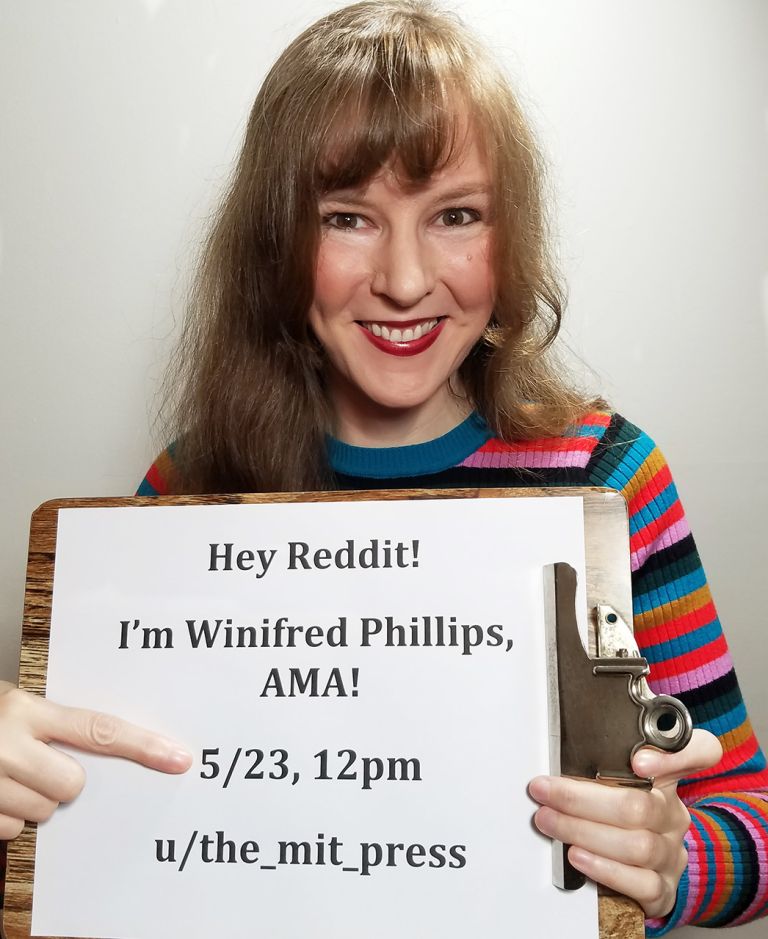 By Winifred Phillips | Contact | Follow
By Winifred Phillips | Contact | Follow
Glad you're here! I'm video game music composer Winifred Phillips, and I'm the author of the book A Composer's Guide to Game Music. Recently my publisher The MIT Press requested that I host a question and answer session on Reddit's famous Ask Me Anything forum, to share my knowledge about game music and spread the word about my book on that topic. I'd be answering questions from a community consisting of thousands of gamers, developers and aspiring composers. It sounded like fun, so last Thursday and Friday I logged onto Reddit and answered as many questions as I possibly could. It was an awesome experience! Over the course of those two days, my Reddit AMA went viral. It ascended to the Reddit front page, receiving 14.8 thousand upvotes and garnering Reddit's gold and platinum awards. I'm so grateful to the Reddit community for their amazing support and enthusiasm!! During the course of those two days, the community posed some wonderful questions, and I thought it would be great to gather together some of those questions and answers that might interest us here at Gamasutra. Below you'll find a discussion focused on the art and craft of game music composition. The discussion covered the gamut of subjects, from elementary to expert, and I've arranged the discussion below under topic headings for the sake of convenience. I hope you enjoy this excerpted Q&A from my Reddit Ask-Me-Anything! If you'd like to read the entire AMA (which also includes lots of discussion of my past video game music projects), you'll find the whole Reddit AMA here.
Questions about workflow
Question: I am really curious to learn what the process of developing music for a game is. I know with film media, musical directors get footage to create along with, how does this process work for games?
Winifred Phillips: You're right about the process with film media. It's a spotting procedure, wherein the director and composer go through the film and look for good opportunities to place music in positions that will have maximum impact. I think that there's a similar philosophy behind how music is placed in games. The game development team and the composer make decisions about where music is going to be most impactful. The difference is that we can't just watch the game all the way through, the way we might watch a film. Instead, we can look at the design documents, look at the currently built levels at whatever stage of development they're currently in, and make decisions based on that. The dev team usually has strong ideas about the role of music in their project, and how they want the music to interact with their game. Sometimes I'll have more input regarding these choices, and other times the team will be fired up about their vision for the role that music will play, and I'll need to execute that vision.
 Question: When composing, what kind of details are important to ensure it fits the game? Do you play through a scene without music before working on the piece?
Question: When composing, what kind of details are important to ensure it fits the game? Do you play through a scene without music before working on the piece?
Winifred Phillips: Cool question! I always love receiving a build of the game while I'm working so that I can play it and get inspired by what the development team is doing. That's not always possible, though. Sometimes the game is just too early in development for me to receive a playable version. In that case, I read all sorts of design documents, look at tons of concept art, have lots of great meetings with the developers to talk about what inspires them and what their vision is for the music of their game. I'll also do a bunch of research before I begin work. The research sometimes focuses on musical style, genre, instrumentation, etc. Sometimes the research also includes topics related to the game narrative and history. I want to understand the world of the game, so that I can create music that's appropriate for it.
Question: How is your typical workflow when writing music for a new scene/part of a game? Like; play the scene once, fiddle around with some melodies, record a quick piece and let it sit for a few days and so on.
Winifred Phillips: I like to watch gameplay video or play a game build (if there's one available) before I start work. Every piece of gameplay has its own visual rhythm, and that has a profound influence on the pacing and momentum of the music I'll create for it. Regarding how I schedule my work -- usually I'm operating on some 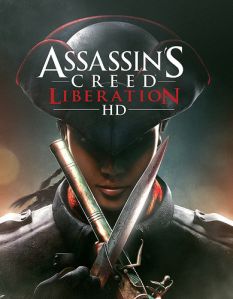 pretty tight deadlines, so I rarely have the luxury to set a piece aside and then come back to it. The music must be finished! The deadline gods will be satisfied! Honestly, there's nothing more inspiring than that terrifying ticking of the clock counting down to a deadline. I amaze myself with how much I can get done.
pretty tight deadlines, so I rarely have the luxury to set a piece aside and then come back to it. The music must be finished! The deadline gods will be satisfied! Honestly, there's nothing more inspiring than that terrifying ticking of the clock counting down to a deadline. I amaze myself with how much I can get done.
Question: I’m interested in your work on God of War and Assassin’s Creed. Those are two, for the most part, period pieces. Do you try and incorporate instruments or styles of music from ancient times? If so, how do you choose where to have modern/period music? As a second question; how much creative freedom do you have? Do it vary gig to gig?
Winifred Phillips: Good questions! I enjoy working on period pieces, because I get to do research and incorporate instruments and performance styles from another time. For Assassin's Creed Liberation, I dug deep into baroque musical structures and instruments, and I learned a -lot- from the experience of creating the music for that game. For God of War I listened to a lot of world music from the locations where the game is based. Of course, we don't really know what the ancient music of Sparta would have sounded like, although there are some guesses being made. Regarding creative freedom -- you are absolutely right. It varies from gig to gig. I've worked on some gigs where the team just gave me their blessing and told me to do whatever I liked. I've also worked on projects where the development team closely supervised everything I did and had detailed instructions at every step of the project. It's important to be able to adapt to whatever the circumstances may be.
Questions about working with development teams
Question: I would consider the music to be a huge part of the feel of any good game; considering what you just said about not having the ability to play a piece of the game before you compose, would you say that you have some creative license to sway the tone and feel of a game? I understand you want to help the game become what it’s supposed to become but sometimes a little creativity can help make the game into something more.
Winifred Phillips: You're right about the creative license that composers sometimes have to define the sound of a game. When we're brought in before the levels are finished, our music might actually have a big impact on the design of those levels. For instance, after I was hired to compose music for LittleBigPlanet 2, my first assignment was to create music for the Victoria's Lab level, and I was given the description of the main character as a sort of mad scientist figure. She likes to build killer robots, and she's a bit nuts. Always a delightful combination! So I composed a track with a lot of dark elements -- gritty guitars, epic orchestral strings, etc. But since it's also a LittleBigPlanet track, I made sure to infuse it with a lot of fun and wacky elements, like calliope, accordion, beat boxing, vocoder, and so on. Later, I found out that after I'd submitted the music, the level designers had gone back to the drawing board and revised the level pretty extensively. When I finally saw the level, Victoria was still a mad scientist, but now she was also a baker. The level was filled with cookies and cakes, and Sackboy could attack the killer robots by hurling giant cupcakes at them. The team at Media Molecule let me know that they'd changed the level because the music had inspired them. I can't express how much that meant to me. The folks at Media Molecule are profoundly gifted and amazing, so I was so touched that my contribution helped to shape their creative process! Here's a vid of that music:
Question: I am a 29 year old who literally loves little big planet! Is there ever a time where you would feel like the music wasn't right for the game and you were forced to pick it because of the director or developer?
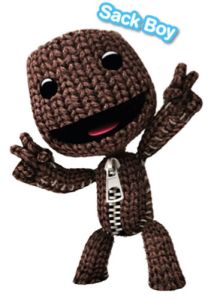 Winifred Phillips: Nothing wrong with being 29 and loving LittleBigPlanet! I love it too! Regarding your question -- I've been asked sometimes to deliver music that seems like sort of an eccentric choice for the game in question. But in those moments, I think it's important to remember that the dev team knows their game a lot better than I do. They know their audience. They also know the overall effect they're trying to create with the music of the game. Creative collaboration doesn't work unless everybody trusts everybody else. I just have to metaphorically close my eyes and do a 'trust fall' in those circumstances. The final result is almost always fantastic!
Winifred Phillips: Nothing wrong with being 29 and loving LittleBigPlanet! I love it too! Regarding your question -- I've been asked sometimes to deliver music that seems like sort of an eccentric choice for the game in question. But in those moments, I think it's important to remember that the dev team knows their game a lot better than I do. They know their audience. They also know the overall effect they're trying to create with the music of the game. Creative collaboration doesn't work unless everybody trusts everybody else. I just have to metaphorically close my eyes and do a 'trust fall' in those circumstances. The final result is almost always fantastic!
Question: In projects where the sound design team and music team are not really coordinating wth each other, how do you ensure the music produced and evaluated stays on brand for a project?
Winifred Phillips: I know what you mean. Really, the sound design team and music team ought to be coordinating with each other! At the very least, there should be some kind of supervisor in the team that's keeping an eye on those things and making sure that the music and sound design work together. In most projects I've worked on, that's the case. However, I also like to ask the team to send me videos of gameplay that include the sound design. That way, I can drop the video with its sound design into my Pro Tools session and hear the sounds of the game while I'm creating the music. This helps me create music that isn't going to clash with the other aural elements in the game.
Questions about dynamic / interactive music composition
Question: What would you consider the main difference between game music and normal music?
Winifred Phillips: Well, normal music has a beginning, that proceeds to a middle, and then concludes with an ending. Game music usually doesn't have any of those things. At its simplest, game music is composed so that it can be repeated indefinitely, which means that it must be composed with a very different composition structure than traditional music. As game composers, we have to think about what qualities will help players to enjoy a piece of music that repeats, and what qualities will lessen that enjoyment. Beyond this simplest of considerations, as game music gets more interactive and responsive to the actions of the player, the whole situation grows exponentially more complex. The music starts getting fragmented into many different segments that can be juggled around according to the action of the game. It can be very challenging for a traditional composer to understand how fundamentally different game music composition is.
Question: Is making game music different from making regular music, is there a guideline to follow?
Winifred Phillips: Regarding making game music -- it couldn't be -more- different than making regular music! Game music is very distinct. The demands on the composer are very different than they would be for a film or television composer, or even for a symphonic composer. Game music has to be interactive. It has to react  to the actions of the player. That's actually really inspiring to me. I feel like I'm having a sort of musical conversation with players. They perform actions, and the music responds. Hopefully the music inspires players on their in-game journey. In terms of the technical aspects, game music has to be constructed in bits and pieces, that can be jig-sawed together by the game engine according to what's going on in the game. I go into a lot of detail about this in my book -- it's a fascinating way to think about music creation, and it's really inspired me to stretch and grow as a composer.
to the actions of the player. That's actually really inspiring to me. I feel like I'm having a sort of musical conversation with players. They perform actions, and the music responds. Hopefully the music inspires players on their in-game journey. In terms of the technical aspects, game music has to be constructed in bits and pieces, that can be jig-sawed together by the game engine according to what's going on in the game. I go into a lot of detail about this in my book -- it's a fascinating way to think about music creation, and it's really inspired me to stretch and grow as a composer.
Question: How do you manage to get certain feelings (tension, etc) to change over time during certain songs? Such as going into combat or coming out of it.
Winifred Phillips: Good question! When we're structuring music for a game, we'll assign different tasks to different compositions. A track may be assigned the task of accompanying the player during exploration. Another track may be assigned to a specific combat sequence. When transitioning from exploration into combat, often the game engine may trigger a specifically-composed transitional composition to play. This may be a short track that helps to ease the player from one piece of music to another, smoothing out the rough edges and helping the transition to feel natural.
Question: So do you ever end up with situations where the game itself is resolving chord progressions or making harmonic functional type changes where you compose something that has a series of chords but they end on what is to be a transition to another section that the gameplay or some kind of randomness might chose where the progression goes next? (so for example like the game itself would chose whether you end up with a cadence or go to another chord which might resolve to something else etc? ) Or is this more of "one theme" and then the game action will trade for "another theme..." but the functions are more or less contained? (and if the answer is NO? Wouldnt it be so cool to for a composer to be involved with game developers to design a game that way!? eg the player would be literally working to resolve tension in the music !)
Winifred Phillips: Wonderful question! What you're describing is the technique and core philosophy of interactive/dynamic music construction. It's challenging for a game composer, but also incredibly stimulating and inspiring. Kind of like trying to solve a really good puzzle. Composing interactive music for a game often requires a game composer to construct the harmonic progressions so that they can transition in several different optional directions -- allowing the game engine to pick and choose depending on what's happening in the game. To make this happen, the composer records the music in separate distinct segments, and the game engine picks and chooses the segments according to what's happening during gameplay. It's a complicated subject -- I actually produced a series of four tutorial videos about it in connection with my book, A Composer's Guide to Game Music. Here's the first video:
Question: I'm working on a retro shooter at the moment and I had an idea to do things that were constructed less from the perspective of whole pieces of music that would fade into one another, but rather as bite-sized function-focused chunks that would be triggered as players entered from one zone to another, confronted enemies, etc. My question for you has to do with interactivity of music and how you design your layers when constructing an adaptive score. Have you ever used level layout and player progress through a level as a way of dictating which layers are faded in/out? If so, are there any best practices you've come up with for the process?
Winifred Phillips: Sounds like you're putting together either a Horizontal Resequencing system or a system based on the triggering of stingers -- not sure which, but either choice is cool. Regarding the layering music system you described... I talk about Vertical Layering a bunch in my book. One of my first experiences with it was for The Maw video game from Twisted Pixel games. Level layout and player progress were both determining factors when making choices about where layers would be triggered and manipulated. The system had three layers of dynamic music per composition -- a layer for slapstick situations, a layer for exploring, and a layer for special circumstances (like flying, fighting, or fire breathing). Depending on where the player was or what the player was doing, the layers would turn on and off or adjust their volume up and down. When I was planning out this system, I combed through the game for good triggering points and drew up a sort-of roadmap for the audio implementation at Twisted Pixel, so they'd know how the music should behave during gameplay. Here's a video of some gameplay from The Maw:
Questions about the creative composition process for video game music
Question: What is your normal first step in creating a composition for a new project? Do you always approach things in a particular order or with a specific method? I'm interested to hear how your process begins for a new piece.
Winifred Phillips: Hey, what a fascinating question! My process for composition is going to depend a lot on the preferences of the development team. Their working method has a lot of influence over mine. They'll tell me which tracks they want me to compose first. They'll give me instruction about style. They'll lay out preferences for the way they want the music to interact with gameplay. All of that has to come into consideration in my composition process. I want to make sure my music is serving their vision. Otherwise, my creative process tends to change with each project, depending on the nature of the music in question. Sometimes I plan things out very meticulously, so that I'll have a very clear idea of what every instrument is doing right from my initial piano sketches. Other times, I just launch right in with instrumental experimentation, like a painter throwing paint on the canvas just to see what happens. It really depends on the nature of the project. :)
Question: Hi! How do you find inspiration for particular melodies/musical themes? Do you just fiddle around until there's a lightbulb moment? Also, how much of a role do themes/leitmotifs play in game composition, because they can make or break films when applied incorrectly/inconsistently.
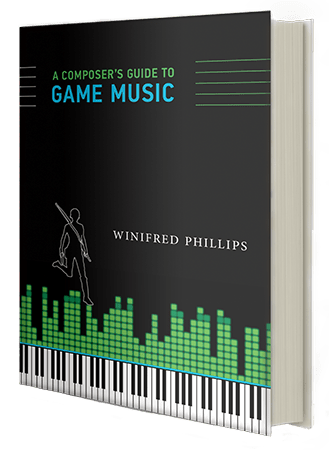 Winifred Phillips: Hey, that's a really good point! I spend a chapter of my book, A Composer's Guide to Game Music, on the importance of musical themes in games. I think that themes can play a pivotal role in helping gamers to fully appreciate a game's narrative. They can also step forward and communicate important information to the player about what gameplay objectives to pursue, and what threats may exist. I try to compose musical themes for all my projects, but the importance of thematic content can hinge on how the development team feels about that idea. They may not be excited about themes, and that's okay. Not every musical score needs to be highly melodic in order to be effective. But themes can be really powerful, so I always try to incorporate them. When I'm composing music for a game, I try to save the big story-driven moments for later in music production. I like to compose exploration and combat music first. These tracks give me lots of opportunity to experiment with themes. Inevitably, some themes will leap out and shine. I'll use those themes in the narrative-driven parts of the game, associating them with characters and situations. This tends to bind the gameplay and the story together really nicely.
Winifred Phillips: Hey, that's a really good point! I spend a chapter of my book, A Composer's Guide to Game Music, on the importance of musical themes in games. I think that themes can play a pivotal role in helping gamers to fully appreciate a game's narrative. They can also step forward and communicate important information to the player about what gameplay objectives to pursue, and what threats may exist. I try to compose musical themes for all my projects, but the importance of thematic content can hinge on how the development team feels about that idea. They may not be excited about themes, and that's okay. Not every musical score needs to be highly melodic in order to be effective. But themes can be really powerful, so I always try to incorporate them. When I'm composing music for a game, I try to save the big story-driven moments for later in music production. I like to compose exploration and combat music first. These tracks give me lots of opportunity to experiment with themes. Inevitably, some themes will leap out and shine. I'll use those themes in the narrative-driven parts of the game, associating them with characters and situations. This tends to bind the gameplay and the story together really nicely.
Question: I love leitmotifs and recurring themes in music, but there have been cases like on Yoshi’s Island 3ds where the same tune was used too much and the music became repetitive and annoying. How do you find the balance between underusing and overusing recurring themes and how many leitmotifs do usually use per game?
Winifred Phillips: You make a good point -- repetition fatigue is a HUGE issue in our work as game composers. I talk about repetition fatigue repeatedly in my book A Composer's Guide to Game Music (in chapters 4, 9, 10 and 12). Avoiding repetition fatigue is incredibly tricky. Regarding how many leitmotifs and recurring themes do I use... that varies per project. For instance, my music for the Speed Racer game only had a couple of recurring themes, but my music for Assassin's Creed Liberation had -loads- of them. I think the depth and complexity of the narrative can exert an influence on how many leitmotifs and themes would work successfully. If the story has lots of characters and explores a lot of important issues and ideas, then it will probably be able to support a large assortment of themes. Otherwise, it might make more sense to use fewer themes and associate them with only the most important aspects of the game.
Advice for breaking into the industry as a young game composer
Question: Do you have any advice for a composer in college who’s just starting their career?
 Winifred Phillips: Thanks for the question. If you're in a college with a game development program, my advice to you is to make friends with those student developers! Also, you can look into student competitions. There's the Imagine Cup, the Independent Games Festival Student Showcase, and the Dare to be Digital "One to Watch" award from BAFTA. Those student teams are going to need a composer, and why shouldn't that be you? You could connect with a student team at your college, or maybe do some internet networking to find a team at another college that might be in need of your help.
Winifred Phillips: Thanks for the question. If you're in a college with a game development program, my advice to you is to make friends with those student developers! Also, you can look into student competitions. There's the Imagine Cup, the Independent Games Festival Student Showcase, and the Dare to be Digital "One to Watch" award from BAFTA. Those student teams are going to need a composer, and why shouldn't that be you? You could connect with a student team at your college, or maybe do some internet networking to find a team at another college that might be in need of your help.
Question: There seem to be countless thousands of would-be game composers out there these days. What can any of us do to help our music (and ourselves!) stand out from the crowd?
Winifred Phillips: You're right, there are a lot of aspiring game composers out there. In terms of what you can do to make your music stand out... that's a hard question. There's usually a lot of discussion about being 'unique' and 'true to yourself' and that's all worthwhile. But I think it makes us feel like we have to put ourselves in a stylistic box, like sticking a label on our foreheads. Personally, I tend to resist that. If I enjoy a style of music, I want to be able to compose in that style. So my recommendation is to compose the music you -want- to compose, and make sure that it pleases you. Apart from that, I think the biggest secret to success here is hard-headed stubbornness. Just don't give up. Keep plugging away. Move mountains. That kind of determination is the special sauce that gives successful composers longevity in this industry.
Question: After you’re in the Industry is it very competitive or is it a very niche market?
Winifred Phillips: Regarding how competitive the industry is... it's -very- competitive. Not terribly niche at all. There are lots of film and tv composers filtering over into the games sector. All are welcome! But game music composition is really -hard- and I'm not sure composers for other media are always fully cognizant of this when they try to cross over into games. It's a completely different art form, and the learning curve is steep.
Questions about the role and function of music in games
Question: How much do you think music elevates a game's storyboard? Movies are often times build around visuals and music but games on the other hand have so much to offer like visuals, gameplay, graphics, story. So was there a point in your work experience where you were came across certain story elements that demanded equal if not more justification for the scene through music? If so how did you.go about it?
 Winifred Phillips: I think that music can do a -lot- to elevate a gameplay experience, and it's not just about the kind of emotional and atmospheric concerns that usually drive these decisions. In games, the experience of the audience is active rather than passive. Because of this, the music has a chance to actually infiltrate the player's thought process and help shape some of the cognitive activities that are going on. I wrote a whole series of articles about this for Gamasutra. The articles were about how the music of Dragon Front interacted with the thought process of gamers. I called the article series, Video game composers can make you smarter! :)
Winifred Phillips: I think that music can do a -lot- to elevate a gameplay experience, and it's not just about the kind of emotional and atmospheric concerns that usually drive these decisions. In games, the experience of the audience is active rather than passive. Because of this, the music has a chance to actually infiltrate the player's thought process and help shape some of the cognitive activities that are going on. I wrote a whole series of articles about this for Gamasutra. The articles were about how the music of Dragon Front interacted with the thought process of gamers. I called the article series, Video game composers can make you smarter! :)
Question: Is "distractiveness" an important aspect of your compositions?
Winifred Phillips: You make a good point. Music shouldn't distract the player. There's a careful balance to be maintained. If the music becomes a distraction, that's a problem. However, if we overreact and make the music so bland that nobody would ever notice it or care about it... then that's a problem too. Got to find a solution midway between the two extremes, I think.
Some technical questions
Question: Are there any technical limitations you have to consider when composing music for games? I know in the past technical limitations could have an effect on what was produced, have you found that to the be the case today?
Winifred Phillips: Interesting question! You're right -- in the past, there were some big technical limitations. Nowadays, that isn't the case... but sometimes we face some technical obstacles. If we're composing music for a game that's trying to achieve a small memory footprint, there may be limits on how much memory is assigned to music at any given time. This may prevent the music from delving into more interactive constructs, wherein several music files might be playing simultaneous in synchronization. Since this would use more memory, it might not be a choice that's available for every project.
 Question: Do you do your own mixing for the music? If so, do you have any general tips regarding the mixing process?
Question: Do you do your own mixing for the music? If so, do you have any general tips regarding the mixing process?
Winifred Phillips: I do all my own mixing. In terms of general tips for the mixing process, I have a favorite mantra I repeat to myself during the mixing process. 'Follow the lines.' In music, there's usually foreground content that gives the composition its shape. Whatever instrument is carrying this content has to receive top priority -- it's tracing the 'line' -- creating the contours of the musical experience we want listeners to have. When I mix, I try to 'follow the line,' and emphasize whatever instruments are giving the music its shape and sense of movement. The line is often traded from instrument to instrument, so following the line becomes very important. In addition to that, I try to prioritize instruments according to their importance in the overall structure of the piece. As the composer, I have very definite ideas about what elements are most important in any ensemble I'm mixing, so I set level automation accordingly. This is one of the reasons why it's great to be able to mix your own compositions.
Question: I’m curious how much you delve into synthesis for your projects?
Winifred Phillips: I'll delve into synthesis from time to time, depending on the project. For the Speed Racer video game from Warner Bros. Interactive, I loaded my sound palette with a lot of synthetic sounds, and I tinkered a lot with them in order to achieve the distinctly analog/retro flavor that I wanted for that project. The whole aesthetic of Speed Racer is focused on a retro-futuristic vibe, so I wanted the music to reflect that as well. I also did some major synth tinkering for one of my latest projects, Sports Scramble for the Oculus Quest. It was fun trying to recreate the feel of those antique synths we remember from techno and hip-hop sports anthems (you can hear some of that in my music for the trailer). Really enjoyed that gig!
Question: Do you have any advice on making the most of limited resources? All I'm working with at the moment is a an iPhone, slightly older laptop, Reaper, some of my own instruments, a midi keyboard, and all the free plugins I can get. I'm an experienced musician and writer but I struggle to create something with a pleasing or professional sonic aesthetic. I worry that no matter how good the composition is, it won't pass for anything usable. Thanks!
Winifred Phillips: I can absolutely sympathize -- it's hard to create the sound you're dreaming about when your tools aren't there yet. However, you might be able to restrict your sound to an electronic or even retro sound palette, and achieve some really satisfying results. What Koji Kondo taught us with Super Mario Bros. is that a fantastic musical theme can transcend the rudimentary instruments that are delivering that theme to our ears. There's a whole movement in game development geared towards the nostalgia of early video games, complete with retro-styled soundtracks. Those games need composers that can discipline their composition style to function well with very limited tools, so that could be an avenue to explore.
Conclusion
That concludes these excerpted questions and answers from my viral Reddit Ask-Me-Anything. The Reddit community was incredibly supportive, and I'm very grateful for their kindness and enthusiasm! Many thanks to The MIT Press for arranging this Reddit AMA! If you'd like to read more, the entire Reddit AMA is available to read on the Reddit Ask Me Anything page.
 Popular music from composer Winifred Phillips' award-winning Assassin's Creed Liberation score will be performed live by a top 80-piece orchestra and choir as part of the Assassin's Creed Symphony World Tour, which kicks off in 2019 with its Paris premiere. As an accomplished video game composer, Phillips is best known for composing music for games in five of the most famous and popular franchises in gaming: Assassin’s Creed, LittleBigPlanet, Total War, God of War, and The Sims. Phillips' other notable projects include the triple-A first person shooter Homefront: The Revolution, and numerous virtual reality games, including Sports Scramble, Audioshield, Scraper: First Strike, Dragon Front, and many more. She is the author of the award-winning bestseller A COMPOSER'S GUIDE TO GAME MUSIC, published by the MIT Press. As a VR game music expert, she writes frequently on the future of music in virtual reality games. Phillips' is a sought-after public speaker, and she has been invited to speak about her work as a game composer at the Library of Congress, the Game Developers Conference, the Audio Engineering Society, the Society of Composers and Lyricists, and many more.
Popular music from composer Winifred Phillips' award-winning Assassin's Creed Liberation score will be performed live by a top 80-piece orchestra and choir as part of the Assassin's Creed Symphony World Tour, which kicks off in 2019 with its Paris premiere. As an accomplished video game composer, Phillips is best known for composing music for games in five of the most famous and popular franchises in gaming: Assassin’s Creed, LittleBigPlanet, Total War, God of War, and The Sims. Phillips' other notable projects include the triple-A first person shooter Homefront: The Revolution, and numerous virtual reality games, including Sports Scramble, Audioshield, Scraper: First Strike, Dragon Front, and many more. She is the author of the award-winning bestseller A COMPOSER'S GUIDE TO GAME MUSIC, published by the MIT Press. As a VR game music expert, she writes frequently on the future of music in virtual reality games. Phillips' is a sought-after public speaker, and she has been invited to speak about her work as a game composer at the Library of Congress, the Game Developers Conference, the Audio Engineering Society, the Society of Composers and Lyricists, and many more.
Follow her on Twitter @winphillips.
Read more about:
Featured BlogsAbout the Author(s)
You May Also Like

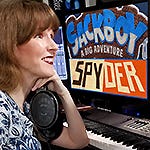





.jpeg?width=700&auto=webp&quality=80&disable=upscale)








